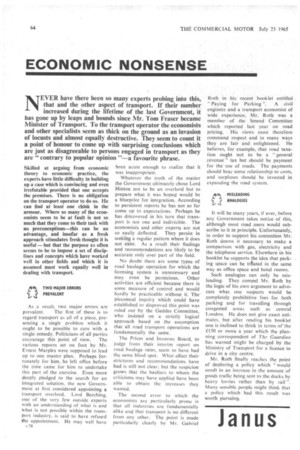ECONOMIC NONSENSE
Page 66

If you've noticed an error in this article please click here to report it so we can fix it.
NEVER have there been so many experts probing into this, that and the other aspect of transport. If their number increased during the lifetime of the last Government, it has gone up by leaps and bounds since Mr. Tom Fraser became Minister of Transport. To the transport operator the economists and other specialists seem as thick on the ground as an invasion of locusts and almost equally destructive. They seem to count it a point of honour to come up with surprising conclusions which are just as disagreeable to persons engaged in transport as they are "contrary to popular opinion "—a favourite phrase.
Skilled at arguing from economic theory to economic practice, the experts have little difficulty in building up a case which is convincing and even irrefutable provided that one accepts the premises. There is no obligation on the transport operator to do so. He can find at least one chink in the armour. Where so many of the economists seem to be at fault is not so much that they come to their task with no preconceptions—this can be an advantage, and insofar as a fresh approach stimulates fresh thought it is useful — but that the purpose so often seems to be to impose a set of disciplines and concepts which have worked well in other fields and which it is assumed must work equally well in dealing with transport.
TWO MAJOR ERRORS PREVALENT
As a result, two major errors are prevalent. The first of these is to regard transport as all of a piece, presenting a single problem which it ought to be possible to cure with a single remedy. Politicians of all parties
encourage this point of view. The various reports set on foot by Mr. Ernest Marpks were supposed to lead up to one master plan. Perhaps fortunately for him, he left office before the time came for him to undertake this part of the exercise. Even more deeply pledged to the search for an integrated solution, the new Government at first considered appointing a transport overlord. Lord Beeching, one of the very few outside experts with an understanding of what is and what is not possible within the transport industry, is said to have refused the appointment. He may well have
(28 been acute enough to realize that it was inappropriate.
Whatever the truth of the matter the Government ultimately chose Lord Hinton not to be an overlord but to prepare what it was hoped would be a blueprint for integration. According to persistent reports he has not so far come up to expectations. Perhaps he has dkcovered in his turn that transport is not one and indivisible. The economists and other experts are not so easily deflected. They persist in seeking a regular pattern where it does not exist. As a result their findings and recommendations are likely to be accurate only over part of the field.
No doubt there are some types of road haulage operation for which the licensing system is unnecessary and may even be pernicious. Other activities are efficient because there is some measure of control and would hardly be practicable without it. The piecemeal inquiry which could have established or disproved this point was ruled out by the Geddes Committee, who insisted on a strictly logical approach based on the assumption that all road transport operations are fundamentally the same.
The Prices and Incomes Board, to judge from their interim report on road haulage rates, seem to have had the same blind spot. What effect their strictures and recommendations have had is still not clear; but the suspicion grows that the hauliers to whom the criticisms may have applied have been able to obtain The increases they. wanted.
The second error to which the economists arc particularly prone is that all industries are fundamentally alike and that transport is no different from any other. The point is made particularly clearly by Mr. Gabriel
Roth in his recent booklet entitled
"Paying for Parking ". A civil engineer and a transport economist of wide experience, Mt. Roth was a member of the Smeed Committee which reported last year on road pricing. His views must therefore command respect and in many ways they are fair and enlightened. He believes, for example, that road taxation ought not to be a " general revenue" tax but should be payment for the use of roads. The payments should bear some relationship to costs, and surpluses should be invested in expanding the road system.
MISLEADING ANALOGIES
It will be many years, if ever, before any Government takes notice of this, although most road users would subscribe to it in principle. Unfortunately, in order to support his contention Mr. Roth deems it necessary to make a comparison with gas, electricity and the telephone service. Elsewhere in his booklet he supports the idea that parking space can be trtated in the same way as office space and hotel rooms.
Such analogies can only be misleading. They compel Mr. Roth by the logic of his own argument to advocate what one suspects would be completely prohibitive fees for both parking and for travelling through congested areas such as central London. He does not give exact estimates, but after reading his booklet one is inclined to think in terms (lithe £150 or more a year which the planning correspondent of The Guardian has warned might be charged by the Ministry of Transport for a licence to drive in a city centre.
Mr. Roth finally reaches the point of deploring a policy which "would result in an increase in the amount of goods traffic being sent to the docks by heavy lorries rather than by rail ". Many sensible people might think that a policy which had this result was worth pursuing.
Janus




























































































































